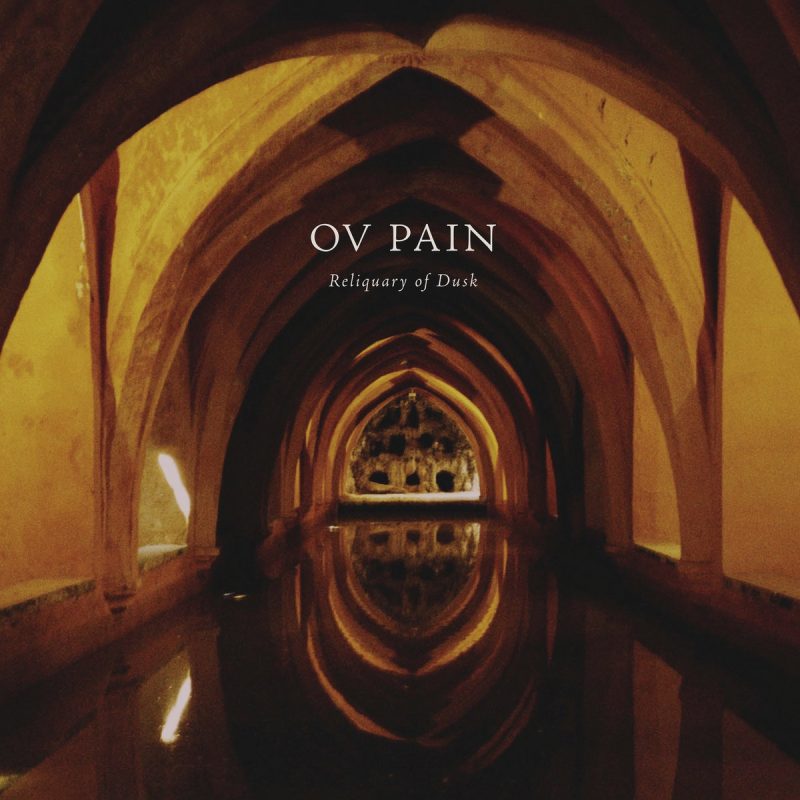People flock, they gather ’round
Obedient in laws of fuss
Spinning wheels and winding deals
Focus on the sly details
Dusk, with its fading light, symbolizes a dying planet, embodying the Earth’s decline due to environmental degradation and unsustainable human practices. This twilight metaphor highlights the gradual loss of ecological vibrancy, serving as a poignant reminder of the urgent need to address these issues before it’s too late, transforming the daily transition into a larger tale about our planet’s precarious future. A reliquary is a practice from antiquity, involving the preservation of relics, which are believed to be the physical remains of saints, within ornately decorated vessels. These sacred containers are sought out by devotees for blessings and comfort, serving as tangible connections to the divine and the historical figures venerated within various faith traditions.
Melbourne-based darkwave duo Ov Pain, composed of New Zealanders Renee Barrance and Tim Player, delves into existential themes with their latest offering, Reliquary of Dusk, released through Melbourne’s It Records. Known for their exploratory approach to music, Ov Pain consistently forges new paths with each album. The Barrance-Player collaboration is known for its adventurous spirit, as evidenced by their varied discography. However, with Reliquary of Dusk, they appear to have honed in on a musical direction that aligns closely with their 2022 work Kauri Island and the lauded The Churning Blue of Noon from 2021. The former showcased a commitment to a slower pace, richer textures, and a minimalist approach, with melodies that were straightforward yet captivating in their repetition. Reliquary of Dusk continues this trend, presenting a refined, atmospheric, and introspective sound. The duo aims to craft an experience that embraces simplicity, allowing listeners ample space to immerse themselves in the music’s complex layers and draw their own interpretive insights.
“Dusk seems an especially operative noun in the context of the historical-material moment,” the band reflects. “It might be thought that we’re living through a moment much akin to dusk, with a bleak future ahead, a future of perpetual darkness. Perhaps.”
Reliquary of Dusk unfolds as an entirely electronic creation, where layered synth drones meld into minimalist rhythms, creating a complex tapestry of slow-emerging melodies that weave and bubble into existence. Barrance’s vocals hover ethereally, offering a seductive yet misleading serenade that unveils grim realities and a sense of existential unease. Her voice, with its gothic nuances, occupies a unique space that recalls the distinctive folk-inflected tones of artists like Nico or Cosey Fanni Tutti, and at times, carries echoes of a feminine Marc Almond. It’s a voice that blends cold, spectral, and industrial elements, yet remains captivatingly alluring despite—or perhaps because of—these characteristics. The fusion of these elements, coupled with Barrance’s adept improvisation, culminates in a harmonious work that echoes the distinct styles of Muslimgauze, Coil, Julee Cruise, and Dead Can Dance.
The songs featuring vocals on the album are compelling; they delve into the recklessness and excessive waste of the Anthropocene era. Barrance is direct in addressing these issues, leaving no room for light-heartedness. The usual optimism found in pop music is tempered, yet pop’s presence is not entirely dismissed. Instead, it’s presented with a sophisticated polish, inviting serious consideration of its substance.
On Evil Hour features the ethereal, chilling vocals of Barrance, setting a mood that reflects on the dangers of mistaking hubris for progress. Through her lyrics, Barrance critiques the contemporary conflation of greed with success and the vulnerability of Western ideals. Illusion and superficiality in human interactions and achievements suggest a sense of emptiness and the transient nature of glory, with an underlying message about the inevitability of change and the search for meaning. Silver Gate depicts a scene of manipulation and deceit, where people are drawn together by superficial attractions and become entangled in duplicitous transactions. The repetition of being “forced unstuck by the fluro shore” suggests a disruptive event or realization that breaks the cycle of deceit, hinting at a potential escape or awakening.
Saturn evokes the feeling of impending closeness to both life’s delicate beginnings – and its inevitable end. We are presented with a gradual approach to reality, marked by decay and transformation, highlighting the contrast between observers and the cursed. The deceptive nature of reality is portrayed as a Prism of L, and the entrapment within fear. The song explores themes of division, the stifling of diversity, and the daily monotony of life under these illusions. The act of unveiling truth is depicted as a revelation of the world’s inherent chaos, questioning the existence of purpose, love, and hate within this framework, and the desire for retribution.
“Are we living in a kind of dusk?” the band asks. “Is perpetual night ahead of us? Should we seek solace in the relics from the past? Or should we all get with the program and march with accelerated emphasis toward our global demise such that we get it over and done with asap and rejuvenation can henceforth begin?”
While Barrance occasionally offers a semblance of romantic respite, her voice, with its siren-like foreboding, never softens the stark portrayal of the apocalyptic reality she aims to underscore. Similarly, the drone backdrops created by the band are more likely to provoke tension than tranquility. The compositions themselves are intriguing oddities, reflecting the uneasy journey towards our collective end—a journey that, inevitably, carries a degree of discomfort.
Reliquary of Dusk may provide just the right space for one to ponder these thoughts. Good luck out there.
Listen to the album below, and order it here.
Reliquary of Dusk was recorded and mixed by Simon Maisch and mastered by Lawrence English.
Follow Ov Pain:
















 Or via:
Or via: